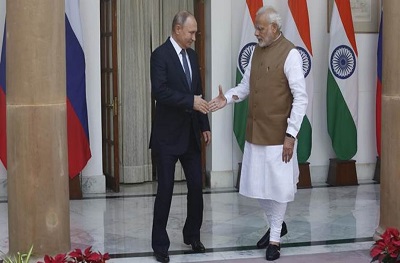The enormous importance of Russian President Vladimir Putin’s two-day visit (October 4-5) to the Indian capital of New Delhi, which led to the signing of several cooperation agreements, particularly in the field of missile production, lies in the fact that it was made amidst threats uttered by the US to impose sanctions against India.
This indicates that, to India, the risk of facing US unilateral sanctions fails to be as important as maintaining the level of independent relations with other states, such as Russia and Iran, and safeguarding the country’s interests.
On Friday, Russia and India held their 19th Annual Bilateral Summit in New Delhi,
attended by President Putin and India’s Prime Minister Narendra Modi.
During this meeting, India signed a number of important documents with Russia including a $5-billion contract to purchase five S-400 air defense systems.
In addition, the two sides inked another eight important deals to further enhance bilateral cooperation in military, space, nuclear energy and economic fields.
According to the two sides’ contract on space cooperation, in an ambitious venture, Russia will help India to send a human to space by 2022.
Military and nuclear energy issues constitute the two main fields of cooperation between India and Russia. Moscow is New Delhi’s biggest supplier of military equipment. Military cooperation between the two sides, however, is no longer limited to selling or purchasing weaponry, having turned into a mutual partnership in conducting research and inventing modern military equipment, such as producing BrahMos – medium-range ramjet supersonic cruise missiles, the Sukhoi Su-30 supermaneuverable fighter aircraft and warships, as well as forming a company to manufacture Kamov Ka-226 helicopters.
India views Russia as an important partner in the field of generating and consuming nuclear energy. In 2014, India’s nuclear energy sector signed a strategic document with Russia’s Rosatom to foster collaboration in the field of using nuclear energy for peaceful purposes.
Commenting on India’s contract with Russia to buy military equipment from the country at a time when Washington has banned such purchases from Moscow, Swaran Singh, a professor of arms control, disarmament and diplomacy at India’s Jawaharlal Nehru University, told IRNA that New Delhi pursues an independent policy and seeks to maintain balance in its relations with major countries, even those showing hostility towards each other.
He added that the incremental improvement witnessed in New Delhi’s relations with all states, ranging from Iran to Saudi Arabia and the UAE, indicates that such a trend is being followed in India’s diplomacy.
Singh noted that India has always preserved its strategic partnership with Iran despite pressures by different US administrations, adding, “The truth is that Moscow is New Delhi’s most reliable partner when it comes to cooperation in sensitive military, space and nuclear sectors.”
At present, he said, 65 percent of the military equipment used by India is Russian. Singh noted that although India seeks to diversify the resources from which it purchases military equipment, it will continue its good relations with Russia, as proven by the contract the South Asian country signed on Friday with Moscow to buy the S-400 air defense systems.
He said the US has already sanctioned China for purchasing these systems from Russia, but Donald Trump will most probably conditionally exempt India from its sanctions, which would be the best possible scenario for all sides engaged in this issue.
Relations between Russia and India are age old and historic, dating back to the Cold War era. During the Cold War, the two sides had strong strategic, military, economic and diplomatic ties. Russia inherited these relations following the dissolution of the Soviet Union. This led to the establishment of a special relationship between New Delhi and Moscow.
Traditionally, relations between India and Russia have been focused on the two sides’ cooperation in political, military, nuclear energy and space fields as well as their collaboration in fighting terrorism. However, a sixth dimension has been added to this relationship: Economic cooperation. Russia and India have decided to increase the value of their annual transactions to $30 billion by 2025; to achieve this, they plan to sign a free-trade agreement.
They frequently support each other in international bodies and meetings and back one another’s accession to global organizations.
India is the second biggest market for Russia’s military industry, purchasing almost 68 percent of its equipment from the European state. In 2017, the two states celebrated 70 years of diplomatic relations between New Delhi and Moscow. For 70 years, the two sides’ partnership, at the bilateral and international levels, has developed steadily. This growing trend, however, has failed to be highly significant in the past few years with India’s growing proximity with the US and Russia forging closer ties with China.
Improving relations with Russia has, nevertheless, always been a main component in India’s foreign policy. Since the signing of ‘Declaration on the India-Russia Strategic Partnership’ in October 2000 – during Putin’s visit to India, New Delhi-Moscow relations have acquired a qualitatively new character with enhanced levels of cooperation in almost all areas of the bilateral relationship including political, security, trade and economy, defense, science and technology and culture. Under this strategic partnership, several institutionalized dialogue mechanisms operate at both political and official levels to ensure regular interaction and follow-up on cooperation activities between the two sides.
During Putin’s visit to India in December 2010, the strategic partnership was elevated to the level of a ‘Special and Privileged Strategic Partnership’.
Annual summit meetings between the prime minister of India and the president of the Russian Federation are the highest institutionalized dialogue mechanism under the strategic partnership between the two states.
IRNA
R.S

